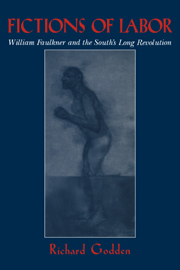Book contents
- Frontmatter
- Contents
- Acknowledgments
- Introduction
- 1 Quentin Compson: Tyrrhenian Vase or Crucible of Race?
- 2 Absalom, Absalom!, Haiti, and Labor History: Reading Unreadable Revolutions
- 3 Absalom, Absalom! and Rosa Coldfield: Or, “What Is in the Dark House?”
- 4 The Persistence of Thomas Sutpen: Absalom, Absalom!, Time, and Labor Discipline
- 5 Forget Jerusalem, Go to Hollywood – “To Die. Yes. To Die?” (A Coda to Absalom, Absalom!)
- Afterword
- Notes
- Bibliography of Works Cited
- Index
- Titles in the Series
4 - The Persistence of Thomas Sutpen: Absalom, Absalom!, Time, and Labor Discipline
Published online by Cambridge University Press: 04 December 2009
- Frontmatter
- Contents
- Acknowledgments
- Introduction
- 1 Quentin Compson: Tyrrhenian Vase or Crucible of Race?
- 2 Absalom, Absalom!, Haiti, and Labor History: Reading Unreadable Revolutions
- 3 Absalom, Absalom! and Rosa Coldfield: Or, “What Is in the Dark House?”
- 4 The Persistence of Thomas Sutpen: Absalom, Absalom!, Time, and Labor Discipline
- 5 Forget Jerusalem, Go to Hollywood – “To Die. Yes. To Die?” (A Coda to Absalom, Absalom!)
- Afterword
- Notes
- Bibliography of Works Cited
- Index
- Titles in the Series
Summary
Seventeen-ninety-one and 1848 are years of revolution; but why in 1934 should Faulkner create and indulge witnesses who would deny that fact? In conversation with General Compson in 1863, Thomas Sutpen suppresses his recognition that to be master is to rest enclosed in the Jacobinical head of a slave. In 1909, Rosa Coldfield delivers a philippic, in preparation for forty-four years, turning on her refusal to acknowledge that the darkness of the “dark house” derives from the instability of the black labor from which it and she take their form. Sutpen was born in west Virginia in 1807 (or thereabouts), while Rosa Coldfield was born in 1845 in Jefferson, Mississippi; they were apprenticed to the peculiar institution, and their denials are therefore perhaps understandable. What is less so is why Faulkner should be interested in evoking and compounding them.
Sutpen's story is nothing if not persistent. Its line of transmission extends from the first gossip at his appearance in Yoknapatawpha County (1833) to Quentin's last denial in “the iron New England dark” of 1910. Why go on so, when Lincoln's Emancipation Proclamation of 1863 declared three million slaves “free,” and the crucial dependencies of slave production were radically reconstructed between 1863 and 1877?
Eric Foner's recent study of that reconstruction calls it “America's unfinished revolution,” and to read the historical documents surrounding tenancy during the mid-thirties (as Faulkner wrote Absalom, Absalom!) is to recognize that the New Deal constitutes the South's “Second Civil War,” another revolution from without, initiating a second and more radical reconstruction of southern labor.
- Type
- Chapter
- Information
- Fictions of LaborWilliam Faulkner and the South's Long Revolution, pp. 115 - 178Publisher: Cambridge University PressPrint publication year: 1997



